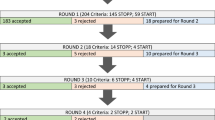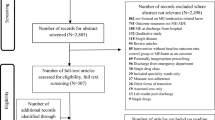Abstract
BACKGROUND: Patients’ ability to manage medications is critical to chronic disease control. Also known as medication management capacity (MMC), it includes the ability to correctly identify medications and describe how they should be taken.
OBJECTIVE: To evaluate the effects of low literacy, medication regimen complexity, and sociodemographic characteristics on MMC.
DESIGN: Cross-sectional analysis of enrollment data from participants in a randomized trial.
PARTICIPANTS: Patients with coronary heart disease in an inner-city clinic.
MEASUREMENTS: Medication management capacity was measured with the Drug Regimen Unassisted Grading Scale (DRUGS), which scores subjects’ ability to identify, open, describe the dose, and describe the timing of their medications. DRUGS overall and component scores were compared by literacy. Mini Mental State Exam score, regimen complexity (number of prescription medications), and sociodemographic characteristics.
RESULTS: Most of the 152 participants were elderly (mean age 65.4 years), women (54.6%), and African American (94.1%). Approximately half (50.7%) had inadequate literacy skills, and 28.9% had marginal skills. In univariate analysis, MMC was significantly associated with literacy (P<.001), and this effect was driven by the ability to identify medications. In multivariable models, patients with inadequate literacy skills had 10 to 18 times the odds of being unable to identify all of their medications, compared with those with adequate literacy skills (P<.05).
CONCLUSIONS: Adults with inadequate literacy skills have less ability to identify their medications. Techniques are needed to better educate low-literacy patients about their medications, as a potential strategy to enhance adherence.
Similar content being viewed by others
References
The Boston Consulting Group. The hidden epidemic: finding a cure for unfilled prescriptions and missed doses; 2003: Available at: http://www.bcg.com/publications/publications_splash.jsp.
Haynes RB, Yao X, Degani A, Kripalani S, Garg A, McDonald HP. Interventions to enhance medication adherence. Cochrane Database of Systematic Reviews, 2005(4).
Osterberg L, Blaschke T. Adherence to medication. N Engl J Med. 2005;353:487–97.
Vermeire E, Hearnshaw H, Van Royen P, Denekens J. Patient adherence to treatment: three decades of research. A comprehensive review. J Clin Pharm Ther. 2003;26:331–42.
Maddigan SL, Farris KB, Keating N, Wiens CA, Johnson JA. Predictors of older adults’ capacity for medication management in a self-medication program. J Aging Health. 2003;15:332–5.
MacLaughlin EJ, Raehl CL, Treadway AK, Sterling TL, Zoller DP, Bond CA. Assessing medication adherence in the elderly. Which tools to use in clinical practice? Drugs Aging. 2005;22:231–55.
Rosenow EC III. Patients’ understanding of and compliance with medications: the sixth vital sign? Mayo Clin Proc. 2005;80:983–7.
Edelberg HK, Shallenberger E, Hausdorff JM, Wei JY. One-year follow-up of medication management capacity in highly functioning older adults. J Gerontol A Biol Sci Med Sci. 2000;55:M550-M553.
Edelberg HK, Shallenberger E, Wei JY. Medication management capacity in highly functioning community-living older adults: detection of early deficits. J Am Geriatr Soc. 1999;47:592–6.
Raehl CL, Bond CA, Woods T, Patry RA, Sleeper RB. Individualized drug use assessment in the elderly. Pharmacotherapy. 2002:22:1239–48.
Farris KB, Kelly MW, Tryon J. Clock drawing test and medication complexity index as indicators of medication management capacity: a pilot study. J Am Pharm Assoc. 2003;43:78–81.
Edelberg HK, Rubin RN, Palmieri JJ, Leipzig RM. Medications and literacy in older adults. Gerontologist. 2001;41(special issue 1):53.
Edelberg HK, Rubin RN, Palmieri JJ, Leipzig RM. Preliminary validation of the drug regimen unassisted grading scale (DRUGS) in community dwelling older adults. J Am Geriatr Soc. 2001;49:S65-S66.
Gokal KA, Echt K. Effect of health literacy on medicine management capacity in older adults. J Am Geriatr Soc. 2003;51(suppl 4):S205, (abstract).
Heller DM, Rubin RN, Edelberg HK. Validation of the DRUGS in a diverse population of community dwelling older adults. J Am Geriatr Soc. 2002;50:S173-S174.
Baker DW, Gazmararian JA, Sudano J, Patterson M, Parker RM, Williams MV. Health literacy and performance on the Mini-Mental State Examination. Aging Ment Health. 2002;6:22–9.
Williams MV, Parker RM, Baker DW, et al. Inadequate functional health literacy among patients at two public hospitals. JAMA. 1995;274:1677–82.
Folstein MF, Folstein SE, McHugh PR. “Mini-Mental State.” A practical method for grading the cognitive state of patients for the clinician. J Psychiatr Res. 1975;12:189–98.
Davis TC, Crouch MA, Long SW, et al. Rapid assessment of literacy levels of adult primary care patients. Fam Med. 1991;23:433–5.
DeWalt DA, Pignone MP. Reading is fundamental: the relationship between literacy and health. Arch Intern Med. 2005;165:1943–4.
Edelberg HK, Rubin RN, Heller DM, Dadiomova Y. Does DRUGS predict functional loss in a diverse population of ambulatory older adults? Preliminary results. J Am Geriatr Soc. 2002;50:S37-S38.
Edelberg HK, Shallenberger E, Hausdorff JM, Wei JY. Application of the DRUGS tool to assess function in ambulatory elderly. J Am Geriatr Soc. 1998;46:S103.
Edelberg HK, Shallenberger E, Hausdorff JM, Wei JY. Short-term follow-up of medication management capacity in highly functioning older adults. J Am Geriatr Soc. 2000;48:S4.
Edelberg HK, Shallenberger E, Wei JY. Medication management capacity in older persons: detection of early deficits. J Am Geriatr Soc. 1999;47:S73.
Edelberg HK, Wei JY. Medication competency and functional decline in the elderly. J Am Geriatr Soc. 1997;45:P98.
Kalichman S, Ramachandran B, Catz S. Adherence to combination antiretroviral therapies in HIV patients of low health literacy. J Gen Intern Med. 1999;14:267–73.
Gazmararian JA, Baker DW, Williams MV, et al. Health literacy among Medicare enrollees in a managed care organization. JAMA. 1999;281:545–51.
Author information
Authors and Affiliations
Corresponding author
Additional information
None of the authors have any conflicts of interest to report.
This work was supported by a grant from the American Heart Association. Biostatistical services were provided by the General Clinical Research Centers Program, National Institutes of Health, and National Center for Research Resources (NIH/NCRR M01-RR00039).
Rights and permissions
About this article
Cite this article
Kripalani, S., Henderson, L.E., Chiu, E.Y. et al. Predictors of medication self-management skill in a low-literacy population. J GEN INTERN MED 21, 852–856 (2006). https://doi.org/10.1111/j.1525-1497.2006.00536.x
Issue Date:
DOI: https://doi.org/10.1111/j.1525-1497.2006.00536.x




